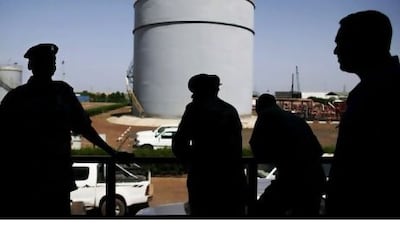JUBA // With Southern Sudan mere months away from declaring independence, leaders of the territory already are making clear that they are considering changes to the way the oil business is conducted in Sudan.
An official in the south's ruling party said last month that if future oil discoveries made in the south were significant enough, the south would consider building pipelines to other destinations aside from Port Sudan in northern Sudan - the route that the south now uses to export its oil.
Oil output and revenue figures have long been disputed in Sudan, but it is estimated that the south accounts for somewhere between 75 and 80 per cent of Sudan's 500,000 barrels per day.
Pagan Amum, the secretary general of the south's Sudan People's Liberation Movement and a minister in the southern government, said: "If there are more oil finds that will justify building new pipelines, then those will be built.
"Southern Sudan is emerging as a landlocked country and it will develop different alternative routes to access the seas," Mr Amum said, adding that the south would be looking to work with neighbouring Kenya and the Democratic Republic of Congo to reach the Indian Ocean and the Atlantic Ocean.
These comments came after Mr Amum declared the south's stance in wealth-sharing negotiations between north and south.
"The notion of sharing wealth will not be there. There is no continuation, whether 50 per cent or anything," he said, referring to the current arrangement established in 2005 when the north and south ended more than two decades of civil war. The present set-up is a 50-50 share of the country's revenues, with southern oil flowing through northern-owned pipelines.
In the immediate post-independence period, however, Mr Amum conceded that there was no alternative to using the northern route.
"Southern Sudan will continue to export its oil through Port Sudan through the pipeline in Khartoum," he said.
For its part, the Khartoum government is working to increase its own oil production. On Wednesday in Khartoum, Sudanese president Omar al-Bashir instructed his oil minister to explore more aggressively for oil in the north. The minister announced this week that exploration was already underway in four blocks in northern Sudan.
Talks continue between north and south to determine how they will interact in the future. An African Union panel, led by the former South African president Thabo Mbeki, is providing support to the mediation. Mr Amum also said last month that a range of issues, including demarcation of the 2,100 kilometre contested north-south border, were being discussed as a package.
The first serious negotiations since the south's independence vote kicked off on Tuesday in Ethiopia. The agenda addresses some of the most critical topics facing the region, including the division of Sudan's debts and assets. Although the south's ruling party seems united in its stance on oil issues, it remains to be seen if the north's National Congress Party will accept the south's proposed arrangement.
Insiders to the negotiations say that this round of talks will be vital to determining how the political dynamics between Khartoum and Juba have or have not changed since the south's independence vote.
The European Coalition on Oil in Sudan, a collection of advocacy groups working on oil transparency issues in Sudan, issued a statement in advance of the talks arguing that the "shared dependency between North and South Sudan requires new forms of co-operation".
The coalition urged leaders from both regions to agree to a "straightforward fee-for-service model", which is similar to the pipeline rental arrangement referred to by Mr Amum in February.
The south is expected to declare independence on July 9. The Sudanese president Omar al Bashir has accepted the results, suggesting that peaceful relations could be possible.

